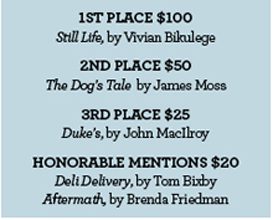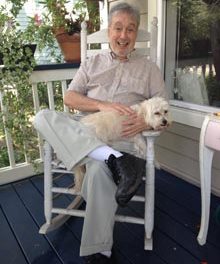 Lowcountry Weekly is pleased to announce the winners of the 4th Annual Sea Island Spirit Writers Short Story Contest. Participation, like last year, was wonderful! The writers were asked to respond to the prompt “a half-eaten pastrami sandwich” in 750 words or less. There were so many great stories, we’re glad the Sea Island Spirit Writers did the judging so we didn’t have to! Those judges were: Donna Armer, Katherine Tandy Brown, Emily Davis Fletcher, Ginny Hall-Apicella, and Jacqueline Markham. Thanks to everybody who entered a short story this year, and congratulations to the winners! And now, without further ado . . . the winning stories…
Lowcountry Weekly is pleased to announce the winners of the 4th Annual Sea Island Spirit Writers Short Story Contest. Participation, like last year, was wonderful! The writers were asked to respond to the prompt “a half-eaten pastrami sandwich” in 750 words or less. There were so many great stories, we’re glad the Sea Island Spirit Writers did the judging so we didn’t have to! Those judges were: Donna Armer, Katherine Tandy Brown, Emily Davis Fletcher, Ginny Hall-Apicella, and Jacqueline Markham. Thanks to everybody who entered a short story this year, and congratulations to the winners! And now, without further ado . . . the winning stories…
Still Life
By Vivian Bikulege
A book, a half-eaten pastrami sandwich, and a used condom. They have one thing in common. My father.
After I identified his body, I went to The Wellington Hotel to collect his things. The trio sat in a still life on the night stand beside the bed. Using a washcloth, I picked up the condom with one hand, the sandwich with the other, and tossed them into a wastebasket. I put the book, Mortality by Christopher Hitchens, into my backpack. I threw away his toiletries, put on his coat, paid the bill, and Uber’d to JFK.
Philip “Lips” Dallimore lived in New Orleans. I live in Asheville, North Carolina. He was a trumpeter and local celebrity known for soulful rhythms in the second lines of city jazz funerals. He was also a cancer patient. Lungs. He never bothered to tell me.
Last time I saw my dad was about two years ago. Between then and now, his cancer metastasized. Spread to his liver according to the coroner. He never mentioned it when I would call. He never bothered to visit me. I don’t remember inviting him.
I loved my dad but I left my growing-up life in the French Quarter. I couldn’t breathe there. Too humid. Too many beads sagging from balconies after too many Mardi Gras parades. And I’d had my fill of booze. I almost drank myself dead after Cil died. Short for Cecilia. My mom. She was an artist. I am too. Mostly oils. North Carolina appealed to me as a person and painter. I took mom’s box of paints and brushes and moved to the mountains. Dad would be okay on his own. He had his horn, his buzzing lips, and the power to inhale enough air to unfurl a hurricane in a single breath if he wanted. He reminded folks of Satchmo. I was reminded that I wasn’t a part of his brass band. I’m shy. In the background. I fade into my paints.
It was easiest to have Lips cremated to carry him home. Ashes resting in a small wooden box, I cradled him on my lap, snug in a window seat on a direct Delta flight.
I wondered about the half-eaten sandwich. The Carnegie Deli is across the street from the Wellington. The deli’s pastrami is lean and kosher, and the sandwiches are colossal. Doesn’t a person lose their appetite in advanced stages of cancer? Maybe the sandwich was hers. I’d found a ticket stub in his coat pocket to Wynton Marsalis playing at Carnegie Hall, the deli’s namesake and next-door neighbor. Dad died sometime after the performance. The autopsy pinpointed early morning. The maid found him.
I put the cremains on the floor between my feet and pulled out dad’s book. Mortality. I skipped ahead a few pages and read, “Carcinoma works cunningly from the inside out.” No doubt. It is a quiet killer. So quiet, my dad forgot to tell me. Or didn’t want to. Hitchens goes on, “…I am badly oppressed by the gnawing sense of waste. I had real plans for my next decade….” Had Lips read these words? He was 60. Cil was 50 when she passed. I’ll be 30. An orphan now but I’d been adrift. I clean vacation rentals for income. It’s winter now. Work has slowed. Ironic how each of us was starting a new decade of endings.
I put the book away and picked up Lips. I think about the condom. Who was she? An old friend or someone he bought? Did he take her to the concert? Give her a chance to hear a New Orleans boy blow his horn. One of dad’s heroes. One of his own. Was the sandwich before or after sex?
On the ground, I take a cab to Royal Street. I have his key. In his apartment, I find sheet music on the kitchen table next to his horn. My name, Aimee, is at the top of the score. It’s unfinished. A Sharpie marker rests diagonally on the page. Aimee means beloved. He was mine. I heave air and cry.
Tomorrow, I’ll call Lips’ boys to lead a second line down Bourbon Street. I’ll dance and twirl an umbrella. I’ll salt the Mississippi with my father’s ashes. I’ll paint puckered red lips on the lid of the wooden box and place my parents’ wedding rings inside with the unfinished music. I’ll create the next decade of my life through art. Their Aimee, unstill and alive.
The Dog’s Tale
By James Moss
The moment of securing a murder scene is pivotal, when chaos turns towards order. The tape goes up. The cast assembles. Everybody plays their part. The patrolmen usher the gawkers away and seal the perimeter. The crime scene unit prepares the gear. The detectives begin sifting the evidence for the truth of what did and what did not happen.
Mintoff set about his work quickly, bustling between the rooms, examining objects, looking under furniture. Occasionally he scrutinized something closely. A lamp. A small box. Then he moved on swiftly, up and down the stairs, into the basement, up to the third floor. He purposely left the room with the body until last. But now he entered. She lay on the bed, clothed, head twisted, mouth open. He stared at the lips, held his breath and tripped slightly on the rug.
“Mintoff!” And then again, “Mintoff!” snapped him abruptly back. He turned quickly and hurried down the stairs to the hallway. Lieutenant Sams was waiting for him.
“What the hell are you doing Mintoff?”
“Surveying the scene, sir.”
“Officer Steadman here says you didn’t even look at the body yet. You’ve been here an hour man and you didn’t look at the body yet?”
Mintoff looked at Steadman. Steadman shrugged. Mintoff continued, “I’ve been taking in the whole scene, sir. I was just about to inspect the body.”
Sams grunted.
“Besides, the M.E. was taking a look at the body and I didn’t want to be in the way. I used the time to see what else I could learn.”
“Well, what did you find out?” asked Sams impatiently.
“Still putting it together, sir.”
Sams looked at Steadman. Steadman shrugged. Mintoff continued.
“Not much to the house. Two bedrooms, one with the body, and a bathroom upstairs; half a basement and a third floor that’s unfinished. There’s a kitchen at the back, a toilet and then these two rooms in front.”
“Signs of a struggle?” asked Sams.
“No sir,” said Mintoff, “just things left a little untidy. You know, stuff lying around.”
“Who lives here?”
Mintoff referred to the notes he made during his canvas of the street, occasionally adding details he’d failed to write down.
“According to neighbors the house is occupied, but not owned by, a couple in their 40’s and their dog. From the mail, it looks like Karen and David McNally. I think that’s Karen on the bed going by the red hair and some of the photos around the place.”
“And where’s master David?”
“No sign. Neighbors say he works but don’t know where. Goes out in some kind of uniform like a service engineer. We’re looking for the victim’s cellphone to see if we can track him down.”
“It’s in her hand,” said the M.E. passing quickly on the way to his van. “Still in her hand. Rigor’s well on its way. I can probably pry it loose as soon as I’ve moved my equipment up there.”
“Time of death!” Sams yelled after him.
Mintoff answered from his notes. “He told me more than six hours not more than twelve, making it sometime between 10 last night and 4 this morning.”
Sams looked at Steadman. Steadman shrugged.
“Well, go help the man!” Sams ordered. Steadman trotted quickly after the M.E. “And bring that phone to me when he’s done prying.” Then again to Mintoff, “Who called it in?”
“A neighbor. The dog was running in and out the front door howling. They came over to check, found the door half open, couldn’t rouse anyone, so called 911.”
“Anyone hear anything, see anything before that?”
“No sir.”
“Weapon?”
“Nope.”
“Great,” said Sams.
“There was one other thing,” said Mintoff.
“Well?”
“A half-eaten pastrami sandwich.”
“What about it?”
“It was in the middle of the living room. On the floor. Right there.”
“You mean on its own?”
“Yes, all on its own. No plate or anything, just there.”
“Where is it now?”
“I had Steadman bag it.”
“Steadman!”
Steadman hurried back inside.
“What did you do with the sandwich?”
“Sir?”
“The pastrami sandwich that was on the living room floor that Mintoff here told you to put in an evidence bag.”
“I don’t think it was pastrami sir.”
“Steadman?”
“Tasted more like ham.”
“Oh for Pete’s sake,” said Mintoff, “it was evidence!”
They fell silent until Sams began slowly, “Why didn’t the dog…”
“…eat the sandwich?” said Mintoff finishing the thought.
Sams and Mintoff turned to Steadman. Steadman shrugged.
Duke’s
By John MacIlroy
“Here’s the thing, deVereaux.”
I didn’t hear Punch Stallings come up behind me. I never do. He is an overripe giant of a man, a former all-conference tackle at Clemson now tending toward the soft and mushy from the good life at the Rusty Scupper, the marsh-side place we own just north of Beaufort. The place is nothing fancy — mostly sandwiches, a funky selection of beers, an oyster roast twice a year — but Punch likes to call himself the Executive Chef, and I always let it go.
We met in high school over on the island, and I am married to his cousin. But he can be . . . annoying. First, he always calls me by my last name. Second, he just appears. His movements defy logic, the laws of gravity and the physics of mass, his impressive bulk floating through the air like the Goodyear blimp until he drifts in for a mooring, silently, right behind you.
And third, he starts just about every conversation with . . .
“Here’s the thing.”
He was at it again. “I found a half-eaten pastrami sandwich, back of the kitchen. Third time this week.”
“Some people eat light, Punch.” He let that go, but wasn’t finished. He never is.
“It wasn’t made with mustard, but with mayonnaise, don’t you see? Duke’s, I’m sure. On white bread, no pickles.” He started shaking. “With lettuce and tomato. Nobody makes a pastrami sandwich like that.” He paused. “Nobody but that new guy, McCollister.”
* * *
A couple months ago, Jefferson McCollister had come up from somewhere near Macon, not long out of the army and on the drift. He had served a tour in Iraq and was looking for a job. We needed a short order cook, something he had done in the army, although he didn’t elaborate. He was hard-working, kept to himself and put up with Punch.
I liked him. Punch didn’t.
“The freaking sandwich looks like a BLT.” Punch wasn’t finished. “Two days ago, I saw McCollister make, then actually eat, a mayonnaise sandwich, nothing but the mayo and bread.”
I held back, because I’m pretty much addicted to mayonnaise, too. Duke’s, of course, Hellman’s in a pinch. But Punch, on some frolic and detour a few years back, had worked at a deli in Brooklyn. He returned with some strange Yankee ways, including a curious obsession with Gulden’s Spicy Brown Mustard and the movie reviews of the New Yorker, although few of their picks ever make the double-features at the Highway 21 Drive In.
“All right, I’ll talk to Jefferson.” I’m always amazed the crap that comes with running this place.
* * *
“What’s up, Mr. deVereaux?”
“Little dust-up with Punch this afternoon.” I shrugged. “You do know most folks around here like a pastrami sandwich made with mustard, right?” I smiled, just to let him know I was the good guy here. “Look, I’m kind of a mayonnaise guy too. But mostly on a BLT.”
“Duke’s?”
I nodded.
Jefferson paused. “Can I tell you a story?”
“Sure.”
“In Iraq, I bunked next to a country boy from Georgia, like me. Raw-boned corporal named Mullins, just turned twenty. His mom sent him a couple jars of Duke’s every month, and we would heap gobs of the stuff on everything. Hamburgers, hot dogs, French fries. Even mixed it into spaghetti . . . once.” He shrugged. “But it wasn’t really about the mayonnaise, you see, it was all about home. It could have been about mustard, or sweet tea, or almost about anything else. It just happened to be mayonnaise.”
He paused. “But Mullins, well, he loved it on a pastrami sandwich, on white bread.” Jefferson slowed a beat. “He was about half-way through one when the Lieutenant pulled him for a quick recon mission. He asked me to wrap it up, hold it for him.” Jefferson looked away. “You see, Mr. deVereaux, he never made it back.”
I didn’t know what to say, so I said nothing.
“Now, every day I can, I make a pastrami sandwich — heavy on the mayo, loaded up with other stuff we didn’t always have over there. I only eat half, and leave the other half for my friend, in case . . . Look, I know that . . . .”
He turned away, then back to me.
“It’s just something I have to do.”







